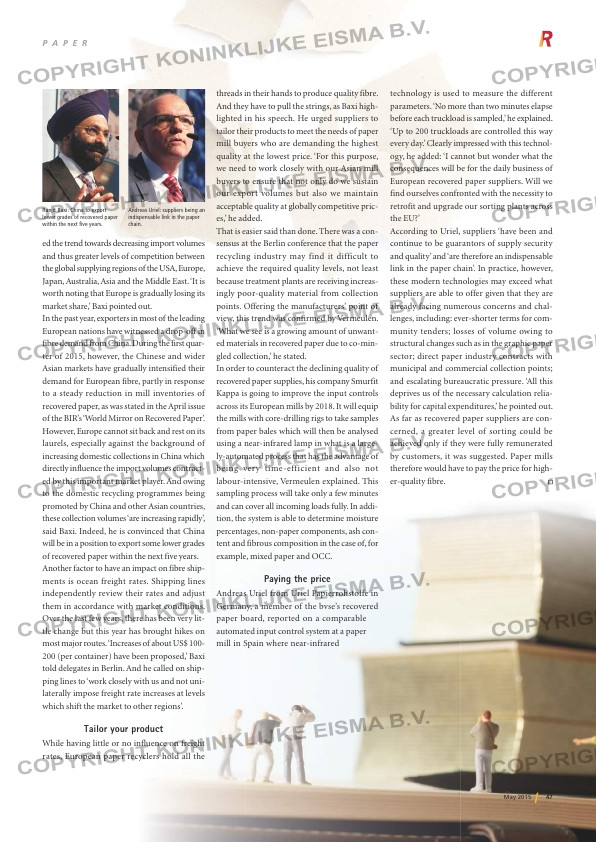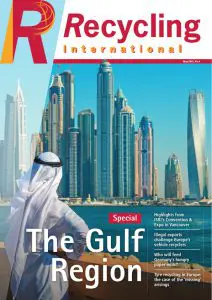Page 47 from: May 2015

47May 2015
P A P E R
ed the trend towards decreasing import volumes
and thus greater levels of competition between
the global supplying regions of the USA, Europe,
Japan, Australia, Asia and the Middle East. ‘It is
worth noting that Europe is gradually losing its
market share,’ Baxi pointed out.
In the past year, exporters in most of the leading
European nations have witnessed a drop-off in
fibre demand from China. During the first quar-
ter of 2015, however, the Chinese and wider
Asian markets have gradually intensified their
demand for European fibre, partly in response
to a steady reduction in mill inventories of
recovered paper, as was stated in the April issue
of the BIR’s ‘World Mirror on Recovered Paper’.
However, Europe cannot sit back and rest on its
laurels, especially against the background of
increasing domestic collections in China which
directly influence the import volumes contract-
ed by this important market player. And owing
to the domestic recycling programmes being
promoted by China and other Asian countries,
these collection volumes ‘are increasing rapidly’,
said Baxi. Indeed, he is convinced that China
will be in a position to export some lower grades
of recovered paper within the next five years.
Another factor to have an impact on fibre ship-
ments is ocean freight rates. Shipping lines
independently review their rates and adjust
them in accordance with market conditions.
Over the last few years, there has been very lit-
tle change but this year has brought hikes on
most major routes. ‘Increases of about US$ 100-
200 (per container) have been proposed,’ Baxi
told delegates in Berlin. And he called on ship-
ping lines to ‘work closely with us and not uni-
laterally impose freight rate increases at levels
which shift the market to other regions’.
Tailor your product
While having little or no influence on freight
rates, European paper recyclers hold all the
threads in their hands to produce quality fibre.
And they have to pull the strings, as Baxi high-
lighted in his speech. He urged suppliers to
tailor their products to meet the needs of paper
mill buyers who are demanding the highest
quality at the lowest price. ‘For this purpose,
we need to work closely with our Asian mill
buyers to ensure that not only do we sustain
our export volumes but also we maintain
acceptable quality at globally competitive pric-
es,’ he added.
That is easier said than done. There was a con-
sensus at the Berlin conference that the paper
recycling industry may find it difficult to
achieve the required quality levels, not least
because treatment plants are receiving increas-
ingly poor-quality material from collection
points. Offering the manufacturers’ point of
view, this trend was confirmed by Vermeulen.
‘What we see is a growing amount of unwant-
ed materials in recovered paper due to co-min-
gled collection,’ he stated.
In order to counteract the declining quality of
recovered paper supplies, his company Smurfit
Kappa is going to improve the input controls
across its European mills by 2018. It will equip
the mills with core-drilling rigs to take samples
from paper bales which will then be analysed
using a near-infrared lamp in what is a large-
ly-automated process that has the advantage of
being very time-efficient and also not
labour-intensive, Vermeulen explained. This
sampling process will take only a few minutes
and can cover all incoming loads fully. In addi-
tion, the system is able to determine moisture
percentages, non-paper components, ash con-
tent and fibrous composition in the case of, for
example, mixed paper and OCC.
Paying the price
Andreas Uriel from Uriel Papierrohstoffe in
Germany, a member of the bvse’s recovered
paper board, reported on a comparable
automated input control system at a paper
mill in Spain where near-infrared
technology is used to measure the different
parameters. ‘No more than two minutes elapse
before each truckload is sampled,’ he explained.
‘Up to 200 truckloads are controlled this way
every day.’ Clearly impressed with this technol-
ogy, he added: ‘I cannot but wonder what the
consequences will be for the daily business of
European recovered paper suppliers. Will we
find ourselves confronted with the necessity to
retrofit and upgrade our sorting plants across
the EU?’
According to Uriel, suppliers ‘have been and
continue to be guarantors of supply security
and quality’ and ‘are therefore an indispensable
link in the paper chain’. In practice, however,
these modern technologies may exceed what
suppliers are able to offer given that they are
already facing numerous concerns and chal-
lenges, including: ever-shorter terms for com-
munity tenders; losses of volume owing to
structural changes such as in the graphic paper
sector; direct paper industry contracts with
municipal and commercial collection points;
and escalating bureaucratic pressure. ‘All this
deprives us of the necessary calculation relia-
bility for capital expenditures,’ he pointed out.
As far as recovered paper suppliers are con-
cerned, a greater level of sorting could be
achieved only if they were fully remunerated
by customers, it was suggested. Paper mills
therefore would have to pay the price for high-
er-quality fibre.
Ranjit Baxi: China to export
lower grades of recovered paper
within the next fi ve years.
Andreas Uriel: suppliers being an
indispensable link in the paper
chain.
RI 4-bvse paper.indd 47 04-05-15 09:21



